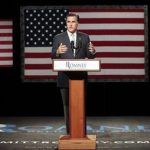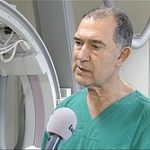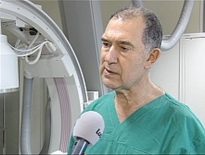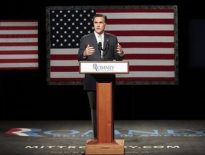CAIRO — The two top-rated Egyptian presidential candidates battled
Thursday over the role of Islam and policy toward Israel in the Arab world’s most populous country as
they took part in the first televised presidential debate in the nation’s
history.

rifts apparent before presidential contest: Egyptians will vote on May 23 and 24 in the first
presidential election since Hosni Mubarak’s ouster.
In homes and cafes, Egyptians sat transfixed by a
debate that stretched past 2 a.m. It featured Amr Moussa, the 75-year-old former chief of the Arab
League, and Abdel Moneim Aboul Fotouh, 60, considered a moderate Islamist. After decades of autocratic
rule, Egyptians will finally have a choice in the presidential election scheduled for May 23 and
24.
The differences between the contenders quickly emerged.
Moussa, who served as foreign minister in the 1990s under Hosni Mubarak, the president ousted in the
January revolution, appealed to Egyptians who long for stability after more than a year of economic and
political tumult and fear the rise of Islamists. Aboul Fotouh sought to reach out to Islamists,
liberals and supporters of the revolution.
In a dramatic move,
Aboul Fotouh called Israel an “enemy” of Egypt and promised to revise the peace treaty with the
neighboring state, which has been a linchpin of Middle East peace. The words will probably resonate
with many Egyptians angry at Israeli policies towards Palestinians but are sure to worry U.S.
officials.
“Israel is an enemy, built on occupation. It owns 200
nuclear warheads and doesn’t respect international decisions,” Aboul Fotouh said. “The agreement with
Israel should be revised, and that which is against Egypt’s interests should be removed immediately and
what is in our interest should stay.”
Moussa said the treaty
should be slightly revised but stopped short of calling Israel an enemy.
“We have lots of disagreements. Most of our people consider it an enemy, but the
responsibility of the president is to deal with such things responsibly and not run after hot-headed
slogans,” he said.
Aboul Fotouh tried to tie Moussa to the
brutal and unpopular Mubarak government, asking how, “as a member of the past regime that people
revolted against, can he become part of the solution?”
Moussa
denied the allegations. “The regime fell with its men, and I wasn’t part of it. I was a minister 10
years ago,” he said. Moussa left his foreign ministry post in 2001.
Moussa accused Aboul Fotouh of being loyal to the traditional Muslim Brotherhood rather than
to the nation. “You defended the Muslim Brotherhood and not Egyptians,” he said.
To run for president, Aboul Fotouh severed ties with the Brotherhood,
which had initially said it would not put forward a candidate. The Brotherhood eventually reversed
course, settling on Mohammed Morsi to seek the job. News reports said Morsi refused to participate in
the debate, but his campaign said he was not invited to join in.
The Brotherhood has come under intense criticism lately for dominating parliament and looking
out for its own interests. Moussa also accused his rival and the Brotherhood of being part of militant
Islamist attacks in the 1990s. Aboul Fotouh confirmed that he was a founder of what he described as a
peaceful Gamaa Islamiya movement but said he was not responsible for those who split off and committed
violence.
On religion, Moussa presented himself as someone who
would respect Islamic law but not allow discrimination against minorities or an expansion of Islamic
jurisprudence. Aboul Fotouh portrayed himself as a unifier who would apply Islamic law fairly but also
limit it to the role that has been spelled out in the constitution for years — as the principle source
of legislation.
Moussa dismissed Aboul Fotouh’s claims that he
could serve as a bridge between polarized parts of society, saying that the Islamist used “double
language. He is Salafist with Salafists [followers of a puritanical form of Islam] and is a liberal
with liberals.”
Special correspondent Haitham Mohamed contributed to this report.





